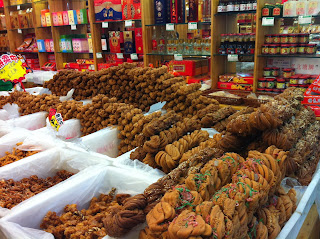Tianjin Day 2 part 1 (because Chinese internet can't handle all this amazingness)
I woke up feeling
refreshed and ready to make the most of my time in Tianjin, as I'd booked my
ticket home for 7 o'clock that evening. Comparatively to Beijing, Tianjin is
pretty small so I felt confident in walking around instead of trying to navigate
the public transports system. The first spot I wanted to get to was the Ancient
Culture Street, with the 'Tin Hau' Temple, which is dedicated to the goddess of
the sea.
To get there I
decided to take the slightly longer walk along the river, which I thought
would be nicer than winding through the side streets in the heat. It was
actually very pleasant, again with families walking along and ferries taking
tourists up and down the river.
I eventually had to head back
towards the city, and wended my way past bike repair stands, and groups of
rickshaw drivers gathered around stands in the street eating dumplings or
noodles. I reached the Ancient Culture street, and was surprised by the
juxtaposition of these monuments glorifying the military and the communist
party and this rebuilt street designed to sell Old China to tourists;
especially considering the devastating effect the Cultural Revolution on Chinas
stores of history.
Admittedly
I hadn’t thought about how I was travelling in the middle of one of the biggest
tourist weeks in Chinas year, but it was crazy busy; just a mass of people
pulling each other along. I managed to work my way into a few shops and admire
the swords in intricate wooden sheaths, shaped jade or the beautifully crafted
teapots. I also checked out some silk painting shops. Alongside this
craftsmanship was the cheap tat familiar to anyone who has been to a Chinese
market, gaudy silk purses, cheap chopsticks, and mass produced kites.
I
found the temple and became very confused about how to go about purchasing a
ticket. It turns out that it’s free but you have to show your ID to get a
ticket. This ticket is then taken off of you and recycled back to the office.
Quite bizarre. The temple was worth it though, with the various quarters of the
different gods beautifully decorated, and in comparison to outside practically
tranquil. Alongside the Goddess of the sea they had a temple dedicated to her
parents, one to wealth, and another to the Grandmother of Family Happiness.
Many people were praying incense, which involves lighting your incense in one
of the burners, bowing three times, leaving the incense in the trough and then
kneeling in the temple. Even here though there were people trying to sell
paintings and such like.
My
next port of call was the Nanshi food street, which I’d been told had lots of
authentic Chinese food from many different provinces. After an hour of walking
I found it, slightly confused by the fact it was in a giant building opposed to
a street, as the name would suggest. There were plastic bowls of noodles
covered in chilli, floured balls of pastry, squid sticks (what is the obsession
with these things), a huge range of Chinese sweets, and at one stand Chinese
whisky. I’d been told I had to try Mahua, which are a Tianjin speciality.
They’re deep fried sesame twists with a range of flavours; cinnamon, black
pepper, red bean paste or peanut.
This
is the Guinness world record holder for biggest Mahua.
So
I purchased some of them to take back to England, along with colourful egg biscuit
rolls. Neither of these went down particularly well with my family, with
someone exclaiming that they looked like ginger pubes… Lovely. I also took home
some mooncakes and dried taro… Again not well received.
For
lunch I chose another Tianjin speciality, Steamed Baozi; they’re akin to jiaozi
dumplings, but you use yeast to create a fluffy texture. These were filled with
pork and very tasty; even though I was sitting on the side of the street and
eating them with a crude pair of chopsticks, out of a plastic bag.















Comments
Post a Comment